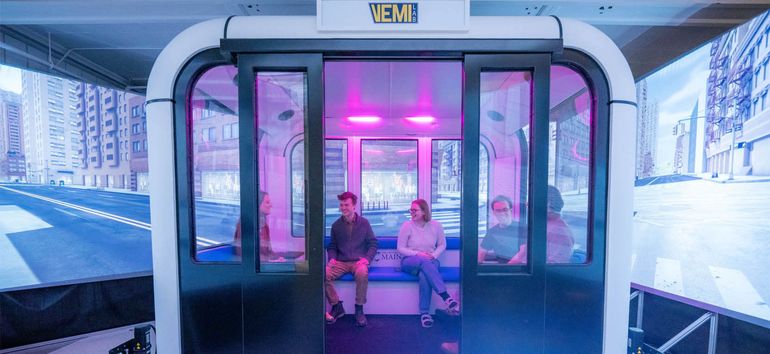UMaine rolls out robo-taxi simulator to help drive vehicle market
 Courtesy / VEMI Lab, University of Maine
The MOISIN simulator has no steering wheel or pedals.The cabin sits on a platform powered by actuators that give passengers the feeling of riding in a vehicle.
Courtesy / VEMI Lab, University of Maine
The MOISIN simulator has no steering wheel or pedals.The cabin sits on a platform powered by actuators that give passengers the feeling of riding in a vehicle.
More Information
The University of Maine at Orono has launched a fully autonomous “people mover” or “robo-taxi” motion simulator, designed to replace today's human-driven taxis or ridesharing services.
The university's VEMI Lab said its Multimodal Omnidirectional Immersive Simulator for Inclusive Navigation or MOISIN (pronounced “mo-sheen”) is unique as a platform for human research in the automotive space.
The simulator has no steering wheel or pedals, and its cabin — outfitted with multi-directional seating for up to six people — sits atop a motion platform that gives passengers the feeling of movement on the road. Cityscapes are projected onto 360-degree screens surrounding the unit, and integrated audio systems simulate both onboard and environmental sounds for a fully immersive experience.
“We’re primarily interested in a concept that we refer to as human-vehicle collaboration, which encompasses the needs of the people in the vehicle, the needs of the vehicle, and where those needs intersect,” said lab director Richard Corey.
According to VEMI, Maine offers a unique environment and opportunity to conduct autonomous vehicle research and testing with a cold-weather climate, diverse road infrastructure that includes major highways, urban centers and logging roads, and an aging, rural populace that some say could benefit from the availability of AVs.
“These factors are drawing automotive industry interest to Maine and creating new opportunities for research and development,” VEMI said.
It was the recognition of this opportunity that led the lab to design and build MOISIN.
A key research question involves exploring inclusive technology to help ensure that future AV technology serves the widest set of user needs possible.
“Fully autonomous vehicles have the potential to meaningfully expand transportation options for many individuals who aren’t able to drive — notably the blind and visually impaired, including older adults — but only if they are designed inclusively,” said VEMI’s chief research scientist and professor of spatial computing, Nicholas Giudice. “Our research aims to ensure that the full range of user needs are considered in that transition.”
The software for the simulator was created by student-led programming teams using Unity and Unreal Engine, interior electrical components, including LED lights and audio systems.
UMaine’s Advanced Manufacturing Center provided design and engineering support.
Part of the College of Liberal Arts and Sciences, VEMI covers a range of disciplines, including biomedical engineering, computer science, interdisciplinary studies, mechanical engineering, psychology, physics and spatial computing.
With assembly complete and initial simulations set up, the VEMI team is working on additional software builds, multisensory user interfaces, and engineering development to refine the experience in preparation for research studies with human participants and continued collaboration with the automotive industry.
The lab will host an open house on April 7, from 4 p.m. to 6 p.m., featuring simulator demonstrations. For more information, click here.













0 Comments